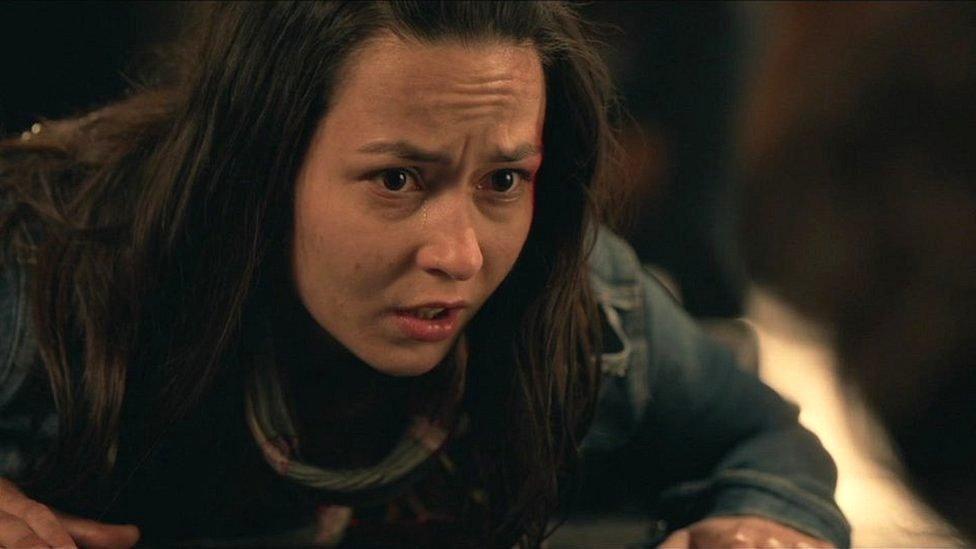Russia's war ignites Orban's tightest election challenge in Hungary
- Published
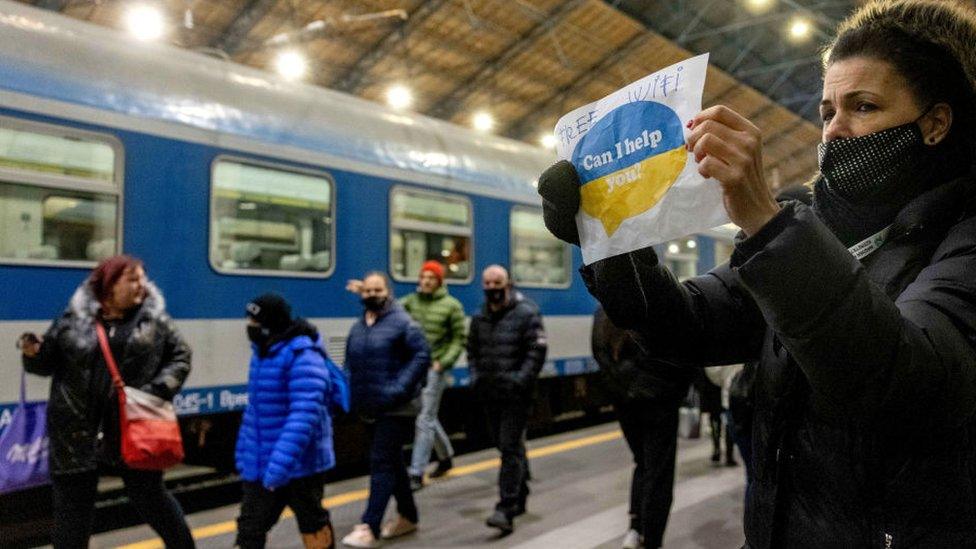
Ukrainians have fled the war across Hungary's eastern border
"Peace or War" is at stake screams the headline in the tabloid Metropol, handed out to morning commuters flocking through the Western Station in Budapest. And there's a neat blue cross in the box next to the "peace" option.
That's the slogan of Viktor Orban's Fidesz party, as it battles to win a record fourth consecutive term in office in elections on Sunday.
After 12 years in power, they face their first genuine challenge from an opposition alliance of six parties that has united under one candidate: Peter Marki-Zay.
And Russia's war in Ukraine has given added impetus to the race.
Hungary shares a border with Ukraine and has taken in more than half a million refugees so far. Mr Orban insists that by helping the people, but refusing to supply weapons to Ukraine, only he can keep Hungary out of the war.
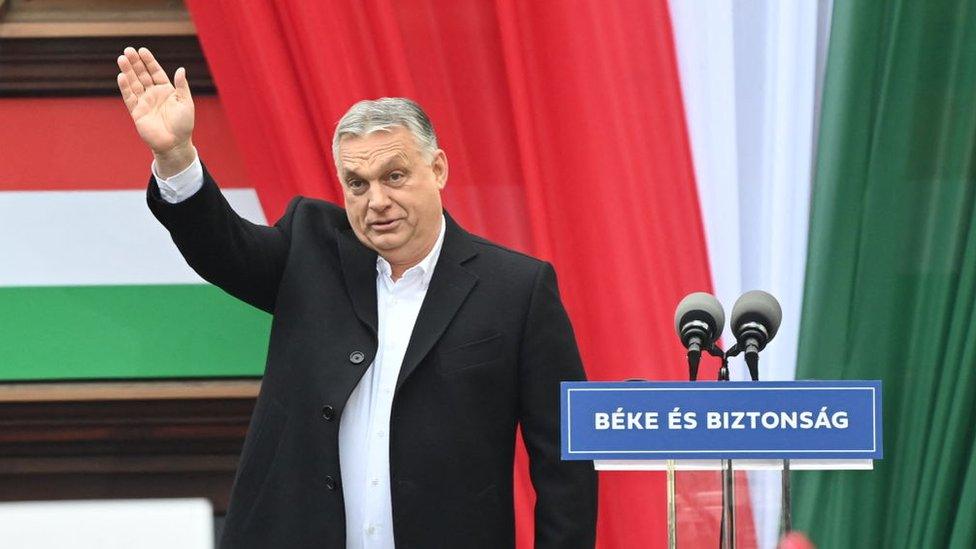
Viktor Orban's party is seeking a fourth consecutive term in office
His party's slogan of peace or war may be simplistic, but it is effective. And it is broadcast, printed, and lit up in bright letters wherever you look in Hungary.
It interrupts any music you play on YouTube, and even videos that include international coverage of the war in Ukraine.
The government has spent eight times more on its campaign than all the opposition parties combined, according to a group of critical monitoring organisations. It helps that the ruling party has the support of a largely pliant media.
The opposition's catch-phrase, on the other hand, is "Orban or Europe".
Their candidate Peter Marki-Zay argues that Hungary should join Poland, the UK and others in supplying arms to Ukraine. And if called upon, and only within a Nato framework, should even consider sending troops.
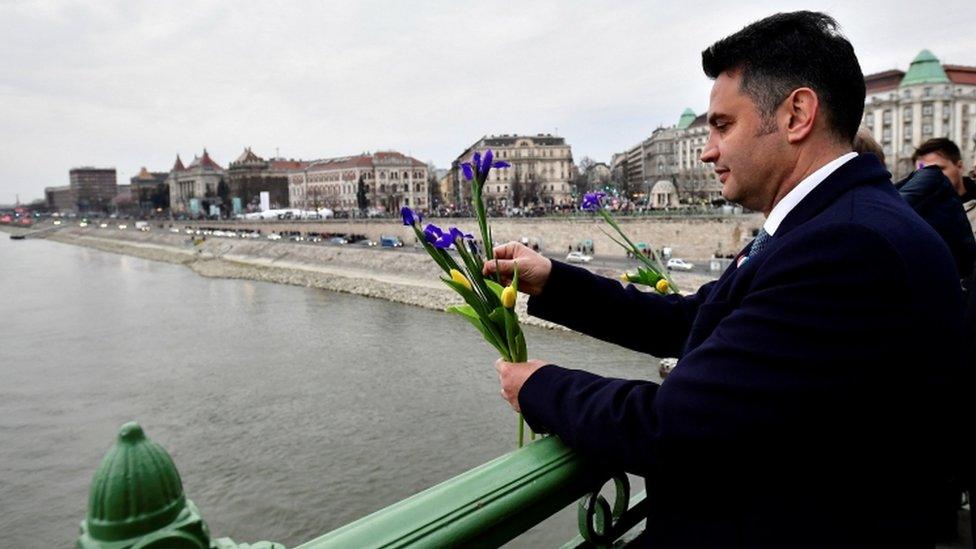
Peter Marki-Zay has backed Ukraine's fight against Russian invasion
The opposition complains that Fidesz has isolated Hungary from the European mainstream, from consensual democracy, fairness and decency. And that in this war Mr Orban has even alienated Hungary's closest allies - Poland, the Czech Republic and Slovakia - the other members of the Visegrad-4 group.
A V4 defence ministers' meeting was abruptly cancelled this week, with the Czech defence minister accusing Mr Orban of valuing Russian oil over Ukrainian blood.
But it was Ukrainian President Volodymyr Zelensky whose message hit home hardest.
"There can be no Russian branches in Europe that divide the EU from within," he said in an address to the Danish parliament on Wednesday. "This must stop, and Europe must stop listening to the excuses of Budapest."
Hungary gets 85% of its gas and 64% of its oil from Russia, through a pipeline that deliberately circumvents Ukraine. However, a Hungary-Russia deal to expand the Paks nuclear power station south of Budapest with Russian finance and technology looks increasingly jeopardised by the war.
And with Hungary's election campaign reaching its peak, President Zelensky chose the recent EU summit to address a very personal message to Mr Orban.
"Listen, Viktor, do you know what's going on in Mariupol? And you hesitate whether to impose sanctions or not? And you hesitate whether to let weapons through or not? And you hesitate whether to trade with Russia or not? There is no time to hesitate. It's already time to decide."
Mr Zelensky also made a poignant reference to Budapest's famous shoe monument on the banks of the Danube.
Look at those shoes. And you will see how mass killings can happen again in today's world. That's what Russia is doing today. The same shoes. In Mariupol, there are the same people

The 60 pairs of bronze shoes remember Hungary's Jews, murdered and pushed into the river by Hungarian fascists in the winter of 1944.
Days after his speech, Ukrainians in Budapest arranged new shoes among the bronze ones on the Danube embankment, decorated with flowers and the blue and yellow ribbons of the Ukrainian flag - in memory of all the dead in Mariupol and elsewhere in Ukraine, victims of the Russian invasion.
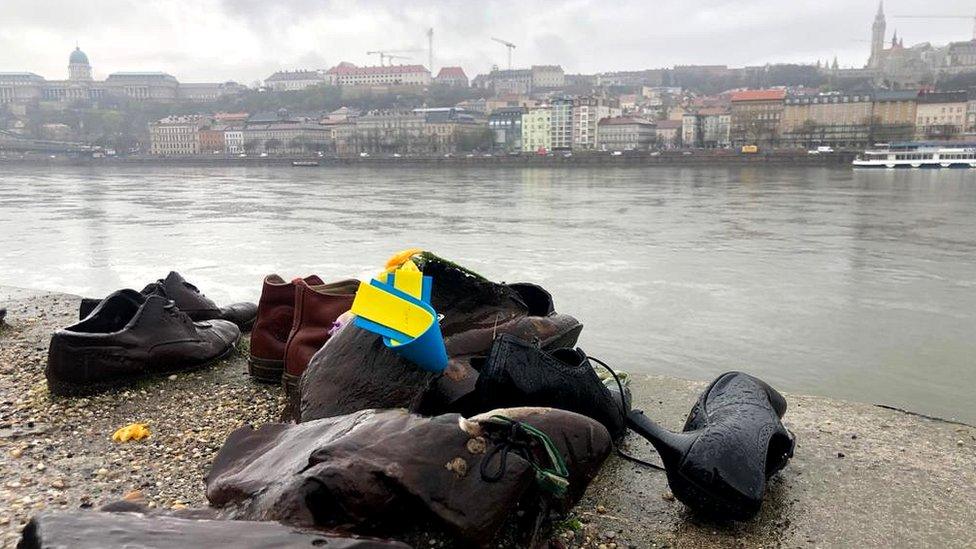
Hungarians laid shoes beside the Danube this week in memory of the victims of Russia's bombardment of Mariupol
The idea that Hungary is isolated from an otherwise pro-Ukraine Europe is an argument the government side bitterly rejects.
Ahead of the vote, Mr Orban told his final campaign rally: "If the opposition wins on Sunday, the next day they will start delivering weapons to Ukraine, and close the taps on the Russian gas pipelines. Our heart is with [the Ukrainians], but Hungary has to stand up for its own interests."

Peter Marki-Zay, 49:
Candidate for six-party opposition, mayor of central town of Hodmezovasarhely since 2018
Backs introduction of euro and joining the European Public Prosecutors Office
Practising Catholic who supports LGBT rights
"[Orban] still cannot decide how to keep an equal distance from the killers and the victims [in Ukraine]"
Viktor Orban, 58:
A fierce anti-Soviet campaigner as a student
First spell as prime minister 1998-2002; returned to power in 2010, 2014 and 2018
Leads a conservative, nationalist government, preaching "illiberal democracy"
"Hungarian policy is neither Ukrainian-friendly nor Russian-friendly: it's Hungarian-friendly"

The election arithmetic suggests a closer race than the government would like.
According to opposition paper Nepszava, Fidesz is assured of victory in 41 of the country's 106 individual constituencies, while the opposition alliance can count on 33.
That leaves 32 battleground districts where the opposition has to break through. The remaining 93 seats in Hungary's 199 seat Parliament are divided according to party lists.
Different polling agencies suggest a record turnout - perhaps as high as 80%, compared with 70% four years ago.
In a country of 9.7 million, the electorate was split almost evenly - 2.6 million apiece - four years ago. Pollsters reckon that this election will be decided by between 300,000 and 600,000 voters who are either undecided or uncommitted, and who are in the cross-hairs of campaigners from both sides.
Watch: Hungarian PM Viktor Orban says the country could host peace talks
Related topics
- Published16 February 2022
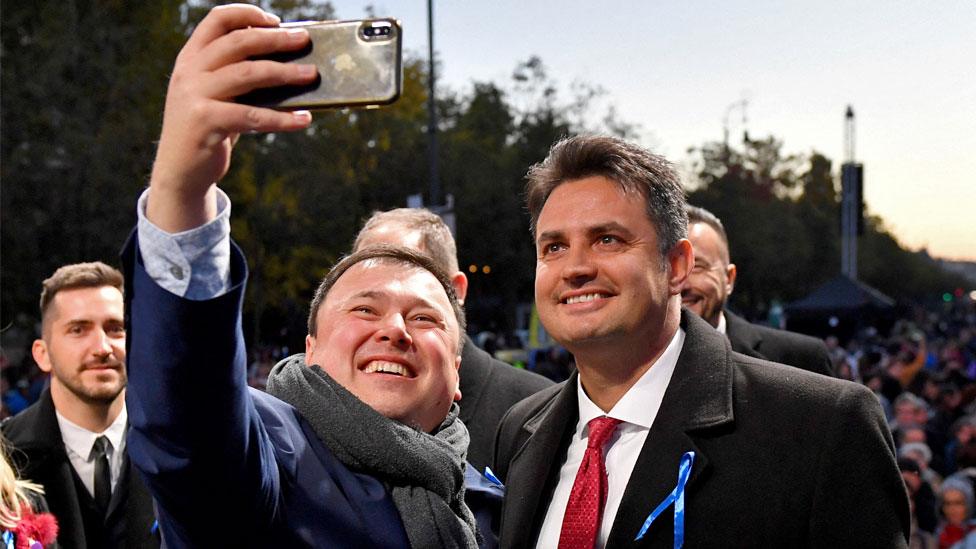
- Published21 December 2021
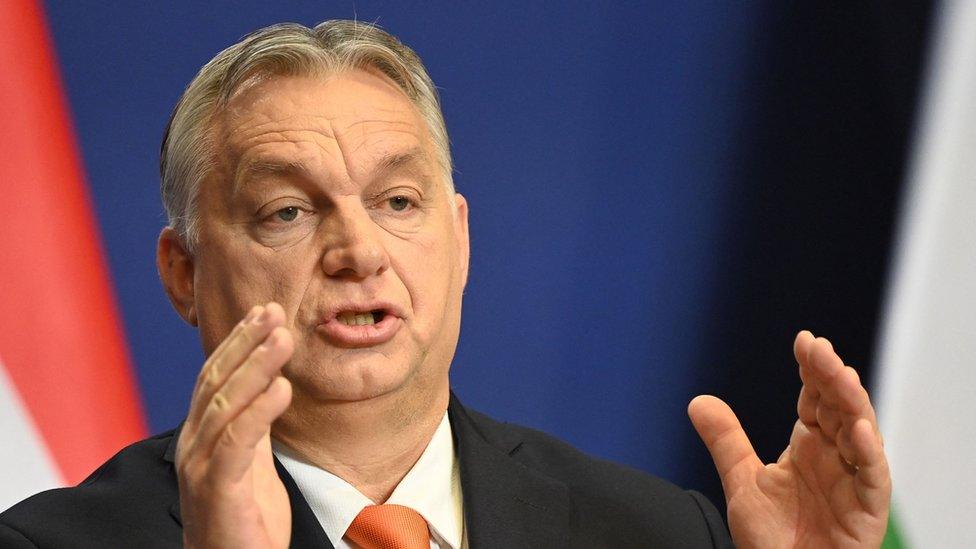
- Published10 October 2021
